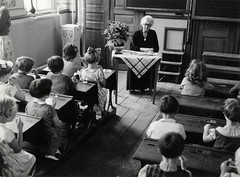In Germany, I have often heard that maintaining state control of the school system and its curriculum is important for maintaining democracy. This argument is used against the idea of private schools and homeschooling: if people can teach children whatever they want, the argument goes, religious fundamentalists of all kinds will raise the next generation for intolerance.
In Israel, this argument has now been turned on its head: Ha’aretz reports that “The Education Ministry has cut most of its budget for the intensive civics classes for 11th and 12th grades, and the regular civics classes for 10th grade, and will invest the sum in the teaching of Jewish studies.” Who needs to teach democracy, equality and civil rights when instead you can push a religion that is now being used by popular religious racists to promote and support the practice of killing children? ((I certainly do not mean to equate Judaism with this sort of racism. My family is full of terrific people who happen to be religiously Jewish and are at least as disgusted by this racism as I am. However, the mainstream in Israel does seem to support a rather nationalistic view of the religion, and the linked article reveals some very disturbing things.))
The good news for Israel is that it has a larger proportion of democratic schools than any other country in the world. ((I did not have the time to find a source to cite for this datum (a quick google search was not enough). I have, however, heard it many times; specifically, I recall Ya’acov Hecht saying that by sheer number of students in democratic schools, Israel has more than any other country in the world — even much bigger ones. There are about 30 democratic schools in Israel, which has a population of about 7 million. I know of no comparable situation in any other country today; the Netherlands had a similar proportion of sociocratic schools (which are a similar thing) but I understand that their numbers have gone down drastically in the past five years.)) These schools will be far less affected by these cuts, and moreover, students in democratic schools finish high school with years of first-hand experience in democracy. The bad news is that a major reason it’s so easy to start a democratic school in Israel is that the system is designed to let in religious schools with essentially no requirement that any particular topic be or not be in their curriculum. There are many more religious schools than democratic schools, and I’m willing to bet few, if not none of them, use that freedom to promote democracy and fight intolerance.
Totalitarianism cannot rise without having a firm control over education in some way or another. The governments of Germany — ridden with national guilt as they have been for the past 60 years — use their tight grip on education to promote democracy; but having such central control makes it possible for shifts in the opposite direction, like the one we are seeing in Israel right now. Wherever intolerance is fostered we must speak out against it and fight it. But a democratic state is always at risk of electing intolerant leaders, and in case that ever happens, we had better make sure those leaders don’t have the power to indoctrinate the young generation. As we say in EUDEC, democratic education is a sensible choice for democratic states.




